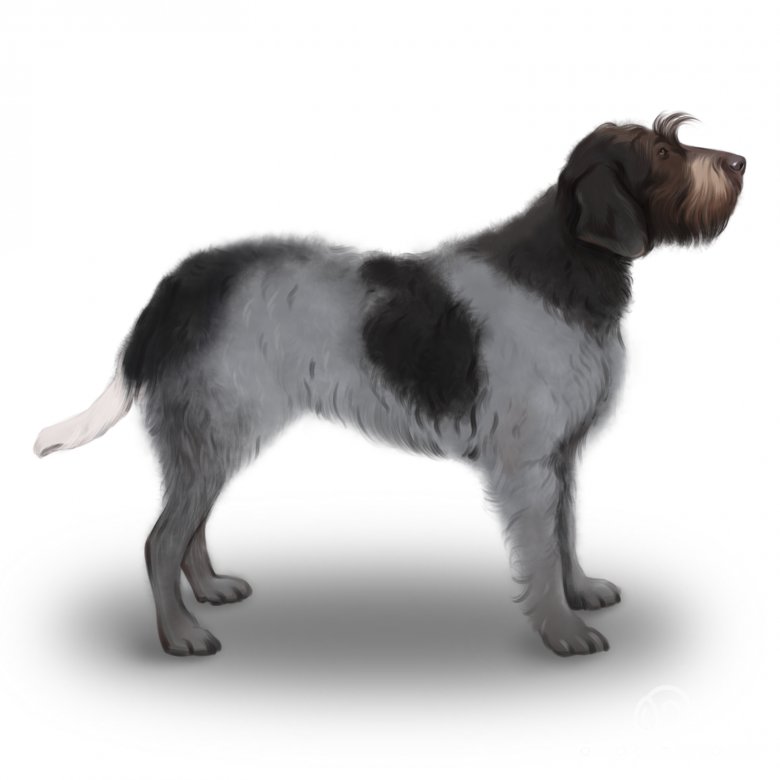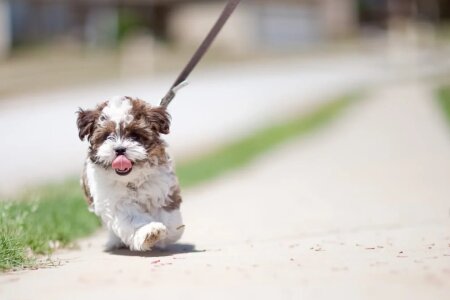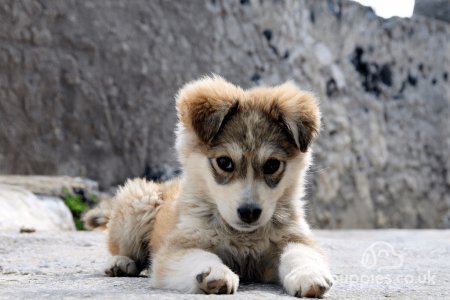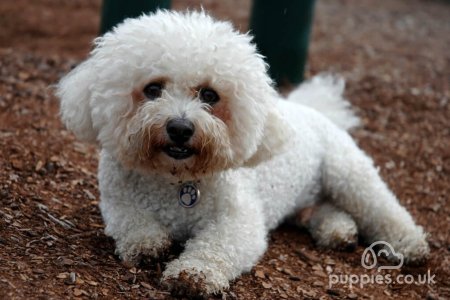Korthals Griffon (Wirehaired Pointing Griffon, Griffon d'arrêt à poil dur Korthals)
Overview
The fluffy, adorable Korthals Griffon (often called the Wirehaired Pointing Griffon) is a loving and affectionate working gundog breed often attributed to the Netherlands, Germany, or France. Regardless, this rare breed (at least in the UK) has earned its place in the hearts of many owners who have had the pleasure of raising a Korthals Griffon.
There are many good reasons to consider purchasing or adopting a Korthal Griffon puppy, but there are also many responsibilities that come along with owning such a wonderful puppy as well.
Physical Appearance
Korthals Griffons have a rustic, vigorous stance that exudes assurance and firmness. Their large, rounded eyes are a dark yellow-brown, revealing their intelligence. Their ears are medium-sized, flat, and set level with their eyes. The tail is normally carried horizontally with a slight bend at the tip. Korthals are a medium-sized breed.
The gait of a Korthals is catlike whilst hunting, but normally they trot or gallop along.
Their coat is harsh, coarse, and reminiscent of boar bristles with no sense of curliness or being woolly. Preferable coat colours are steel grey shade with liver patches or liver coat, or alternatively a liver-roan with a combination of liver and white. White and brown or white and orange coats are also possible.
The Korthals Griffon resembles the German Wirehaired Pointer, German Roughhaired Pointer, and, to a lesser extent, the Pudelpointer breeds.
How big do Korthals Griffon dogs get?
Character Traits
Korthals Griffons are quite intelligent and always eager to please their owners. Their temperament can perhaps best be described as gentle and proud, vigilant and protective of both his territory and his owner.
While above average in intelligence, Korthals Griffons do require a steady and firm hand during training. They can be trained with relative ease, but owners must always treat them with dignity and respect as they are sensitive to harsh punishment.
This breed has all of the characteristics needed to be an excellent guard dog, but unfortunately, they are not very good in this endeavour on account of their gentle, composed temperament. They do, however, make for superb watchdogs.
Are Korthals Griffon dogs intelligent? Yes.
Are Korthals Griffon dogs affectionate? Yes.
Do Korthals Griffon dogs have high or low energy levels? High energy.
Are Korthals Griffon dogs loyal? Yes, very.
Are Korthals Griffon dogs playful? Yes, very.
Are Korthals Griffon dogs aggressive? No, but they may show signs of aggression if they feel uncomfortable around others.
Are Korthals Griffon dogs easy to train? Yes, very.
Are Korthals Griffon dogs good guard dogs? Not really, but they make excellent watchdogs as they are territorial and protective by nature.
Ability to Socialise
As an affectionate and gentle breed, Korthals Griffons tend to get along well with other dogs, cats, children, and strangers. Naturally, as with most breeds, early socialisation is crucial to ensure good behaviour is promoted and to correct any naughty behaviour.
Around other pets, Korthals Griffons may at first feel discomfort or, at worst, show signs of aggression. Early socialisation can correct this provided the owner trains the puppy respectfully and with positive reinforcement. Once they have been accustomed to other pets, they tend to get along peacefully.
With children, Korthals are lovingly playful and tend to get along well, but around younger children they may behave in a boisterous manner and get a little too excited at times. They thrive on social interaction, which is a wonderful trait, but rough play should be avoided. Maintain supervision at all times when your puppy is playing with young children.
Korthals do have a prey drive, owing to their breeding as hunting gundogs, so they may be prone to chase.
Do Korthals Griffon dogs get along with other pets? Generally yes, although they may chase small pets around the home.
Do Korthals Griffon dogs get along with other dogs? Yes, generally.
Are Korthals Griffon dogs good with kids? Yes, but they may be boisterous around young children.
Are Korthals Griffon dogs good with strangers? Yes, but they may be timid around strangers at first.
Lifestyle Suitability
Originally bred for hunting game birds and waterfowl in undergrowth and around water, Korthals Griffons are far more adaptable to rural environments on large estates where they can play and roam off-lead in a secure, fenced area.
Consequently, they will not adapt well at all to small, enclosed environments such as urban apartment dwelling or in small homes without a garden. Moreover, first-time owners may wish to consider a different breed since Korthals Griffons require a careful, experienced hand to train well.
On the positive side, Korthals Griffons do not shed too much and may be a good choice of hypoallergenic dog for allergy sufferers. They can be left at home for brief periods, and tolerate hot and cold climates fairly well.
Are Korthals Griffon dogs good for first-time owners? Not really.
Are Korthals Griffon dogs hypoallergenic? Yes.
Are Korthals Griffon dogs prone to drooling? Yes.
Are Korthals Griffon dogs a good breed for apartment living? Not at all.
Do Korthals Griffon dogs shed a lot? Moderately.
Do Korthals Griffon dogs bark a lot? Not really, but they may bark when they feel nervous or threatened.
Can Korthals Griffon dogs be left alone at home? Only for brief periods.
Can Korthals Griffon dogs handle the heat? Somewhat.
Can Korthals Griffon dogs handle cold temperatures? Yes.
Are Korthals Griffon dogs sensitive to loud noises? Yes.
General Health & Health Issues
Compared to other breeds, Korthals Griffons have about an average rating in terms of health. They may potentially suffer from a number of hereditary health conditions which should be carefully screened for before purchasing or adopting a puppy for your home.
If your Korthals Griffon puppy is healthy, it is nevertheless important to have him brought into the veterinarian clinic at least once every few months for a routine checkup and to identify and diagnose potential health concerns before they become serious.
Some common problems include:
Hip dysplasia: a hereditary condition, hip dysplasia is the development of potentially painful and/or uncomfortable hip movements as the Korthals Griffon grows, potentially leading to arthritis;
Bloat: a common health condition for many breeds, bloat can result from overeating or eating an improper diet. Carefully observe a strict feeding regimen and speak with your veterinarian to diagnose;
Luxating patella: common to many small and toy-sized breeds, a luxating patella is a knee condition that can be uncomfortable or downright painful. Veterinarians can diagnose this typically at around the six-month mark of puppyhood;
Elbow dysplasia: similar to hip dysplasia, elbow dysplasia is a developmental, hereditary medical condition that can be painful for the Korthals Griffon’s elbows, thus affecting gait. Surgical treatments are available to correct elbow dysplasia.
How long do Korthals Griffon dogs live? - 10-12 years
Exercise & Play Time
Korthals Griffons are a high energy breed that require plenty of mental and physical stimulation. A tired dog is a happy dog, which is an old but true saying in this case. They should get about 1-2 hours of good exercise every day, preferably in open outdoor spaces where they can safely roam off-lead.
Give your Korthals Griffon a good morning walk or jog and follow up with some strenuous exercise later on in the afternoon or evening. As a gundog, he will instinctively enjoy using his prey drive and hunting instincts which you may stimulate either with hunting or simply by throwing a ball or stick for him to chase.
Considering that Korthals Griffons were bred to hunt waterfowl, amongst other prey, they are no stranger to splashing around in the water and will most likely enjoy swimming.
How much exercise does a Korthals Griffon dog need? - About 1 hour per day
Do Korthals Griffon dogs like water play? Yes, they love to be around water.
Nutrition & Feeding
Although Korthals Griffons appear lean and muscular and are medium-sized, they consume a significantly high quantity of food. For this reason, it is very important that prospective owners adhere to the breeder’s feeding schedule and adjust as necessary to promote healthy feeding habits and to promote overeating and bloat, which is particularly common as Korthals Griffons age.
Are Korthals Griffon dogs prone to weight gain? Yes.
How much should I feed a Korthals Griffon puppy? About 290-590g per day, in 3-4 sessions.
How much should I feed an adult Korthals Griffon dog? About 290-420g per day, in total.
Care & Maintenance
Grooming is fairly average for Korthals Griffons, both in terms of frequency and complexity. Their coats naturally wick away water and dirt, which reduces the need to clean them off after playing outdoors. Nevertheless, they do require regular grooming at least a few times a week.
Emotionally, Korthals Griffons are high maintenance - not that that should be a problem. Owners should be fully prepared to devote plenty of time and affection to their Korthals Griffon. They can be fairly demanding, simply because they develop strong bonds of affection over time with their owners.
- Grooming: at least twice per week, brush off any dead hairs during grooming sessions. Have your Korthals Griffon hand-stripped at a professional groomer’s twice per year to keep his coat uniformly clean and healthy.
- Emotional care: while Korthals Griffons are territorial and protective, they also depend on social interaction. They should never be left alone for more than a few hours at a time. They may become nervous or bored and engage in naughty behaviour if this becomes a habit.
History of the Korthals Griffon
The Korthals Griffon, as it is known today, was originally bred in 1874 by Dutchman Eduard Karel Korthals, from whence the breed’s name originated. His intention was to create a versatile hunting gundog with all of the best characteristics he could muster.
There is some debate over the country of origin, but it is documented that the breeder, Eduard Korthals, was a Dutchman and the original breed he used was from the Netherlands. The breed was established, however, in Biebesheim am Rhein, Germany at the Ipenwoud kennel. The breed was established and recognised in France thereafter.
Today, the Korthals Griffon is recognised by the Société Centrale Canine in France, the Kennel Club, and the American Kennel Club. It remains a relatively unpopular breed today.
Interesting Facts About Korthals Griffon Dogs
It is possible, as noted by the Federation Cynologique Internationale, that the Korthals Griffon is a descendant of an ‘oysel dog’ widely seen throughout Europe at the time of Xenophon;
During Eduard Korthal’s stay in Germany, the Kaiser awarded Korthal a medallion for the superb hunting performance of his breed;
The Korthals Griffon is a rare breed in the UK.
Getting a Korthals Griffon Puppy
It may be difficult to acquire a Korthals Griffon puppy in the UK, considering their rarity alone. For anyone considering the purchase of a Korthals Griffon puppy, please consider consulting our buying guide to ensure that you understand the responsibilities that come along with owning a Korthals puppy.
How much does a Korthals Griffon cost to buy? - About £650-£1,000.
How much does a Korthals Griffon cost to feed? - An adult Korthals Griffon costs about £1.50-£1.90 per day to feed.
How much does insurance for a Korthals Griffon cost? - About £25-£45 per month.
Sensible alternatives to purchasing a new Korthals Griffon puppy include rescue and adoption.
Additional resources can be found via Korthals Griffon registries and associations such as:











